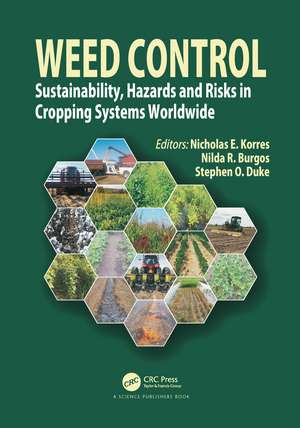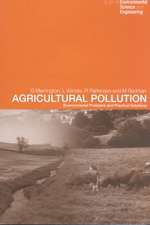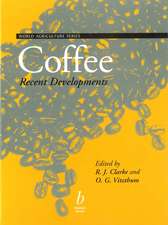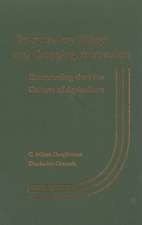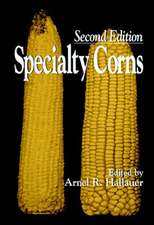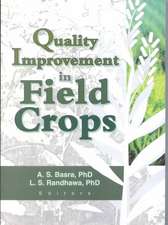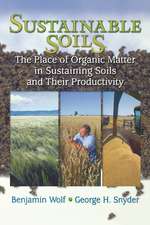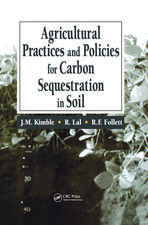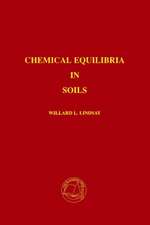Weed Control: Sustainability, Hazards, and Risks in Cropping Systems Worldwide
Editat de Nicholas E. Korres, Nilda R. Burgos, Stephen O. Dukeen Limba Engleză Paperback – 31 mar 2021
This book will be an invaluable source of information for scholars, growers, consultants, researchers and other stakeholders dealing with either arable, row, cash, vegetables, orchards or even grassland-based production systems. The uniqueness of this book comes from the balanced coverage of herbicide effects on humans and environment in relation to best weed control practices of the most important cropping systems worldwide. Furthermore, it amalgamates and discusses the most appropriate, judicious and suitable weed control strategies for a wide range of crops. It reviews the available information and suggests solutions that are not merely feasible but also optimal.
| Toate formatele și edițiile | Preț | Express |
|---|---|---|
| Paperback (1) | 500.78 lei 3-5 săpt. | |
| CRC Press – 31 mar 2021 | 500.78 lei 3-5 săpt. | |
| Hardback (1) | 1584.28 lei 6-8 săpt. | |
| CRC Press – 8 ian 2019 | 1584.28 lei 6-8 săpt. |
Preț: 500.78 lei
Nou
Puncte Express: 751
Preț estimativ în valută:
95.82€ • 100.58$ • 79.54£
95.82€ • 100.58$ • 79.54£
Carte disponibilă
Livrare economică 20 martie-03 aprilie
Preluare comenzi: 021 569.72.76
Specificații
ISBN-13: 9780367780494
ISBN-10: 0367780496
Pagini: 680
Dimensiuni: 178 x 254 x 35 mm
Greutate: 1.44 kg
Ediția:1
Editura: CRC Press
Colecția CRC Press
Locul publicării:Boca Raton, United States
ISBN-10: 0367780496
Pagini: 680
Dimensiuni: 178 x 254 x 35 mm
Greutate: 1.44 kg
Ediția:1
Editura: CRC Press
Colecția CRC Press
Locul publicării:Boca Raton, United States
Cuprins
PART 1: WEED SCIENCE-SUSTAINABILITY, HAZARDS AND RISKS. Sustainable agriculture and integrated weed management. Effects of herbicides on humans. Effects of weed management on soil ecosystems. Effects of herbicides on freshwater ecosystems. Direct and Indirect Effects of Herbicides on Insects. Evolution of Herbicide-Resistant Weeds. Microbial Herbicides. Natural Product-Based Chemical Herbicides. Allelopathy for Sustainable Weed Management. Genetically Engineered Herbicide Tolerant Crops and Sustainable Weed Management. PART 2: SUSTAINABLE WEED CONTROL IN CROPS AND CROPPING SYSTEMS. Sustainable Weed Control in Small Grain Cereals (Wheat/Barley). Sustainable Weed Control in Maize. Grain Sorghum. Sustainable Weed Control in Rice. Sustainable weed control in soybean. Sustainable Weed Control in Cotton. Sustainable Weed Control in Oilseed Rape. Sustainable Weed Management in Peanut. Sustainable Weed Control in Tobacco. Sustainable Weed Control in Strawberry. Sustainable Weed Control in Vegetables. Small Fruits. Sustainable Weed Control in Coffee. Advances in weed management in tea. Weed Management in Sugarcane. Sustainable weed control in pineapple. Sustainable Weed Control in Natural Rubber. Sustainable Weed Control in Orchards. Sustainable Weed Control in Grapes. Sustainable potato weed management. Sustainable weed control in Sugar Beet. Sweet potato: Important weeds and sustainable weed management. Sustainable Weed Control with Aromatic Plants and Essential Oils. Issues and Sustainability in Grassland Weed Control. Organic Farming and Sustainable Weed Control.
Notă biografică
Nicholas E. Korres received his MSc in Crop Physiology and his PhD in Weed Science from the University of Reading and his post-graduate degree in Operational Research and Applied Statistics from the University of Salford. His current research, at the University of Arkansas-Fayetteville, USA, involves, amongst other, weed demographics and population dynamics within crops, cropping systems or diverse environments, weed eco-physiology, weed-crop interactions and integrated weed management. He has published widely in weed science, agronomy, abiotic stress and climate change effects on crops and weeds and bioenergy production.
Nilda R. Burgos is a Professor of Weed Physiology at the University of Arkansas-Fayetteville, USA. She studies herbicide-resistance; fitness consequences of herbicide resistance; abiotic stress tolerance in crops and weeds; allelopathy and herbicides for weed management; interaction of growth regulators and herbicides; adjuvants; and gene flow between rice and weedy rice. She teaches graduate courses on Ecology and Morphology of Weedy and Invasive Plants and Physiology of Plant and Herbicide Interaction. She also team-teaches Weed Science Practicum and Advanced Crop Science. She is President of the International Weed Science Society for 2016-2020.
Stephen O. Duke received his PhD in botany from Duke University in 1975. He is a plant physiologist with the Agricultural Research Service of the USDA. Best known for his research on herbicide modes of action and natural products for weed management, he has over 400 peer-reviewed publications and has been editor or co-editor of ten books and co-author a textbook on mode of action of herbicides. He is Editor-in-Chief of Pest Management Science, and has been president or chair of several scientific societies, including the Weed Science Society of America and the International Weed Science Society.
Recenzii
"…In this modern area of social media, with tweets and 20 second sound bites, serious discussions often lack a depth of understanding. Another challenge in modern communications is our viewpoints on a given topic may become unnecessarily narrowly focused and inflexible. This book by Korres and two other editors does not suffer from these deficiencies.
The total number of pages in the book is greater than 600, so to say it glosses over and skims over superficially the important topics of weed control and agriculture is not true. The book also contains a wide diversity of viewpoints that are presented by a plethora of individual authors for the various chapters. I found the book to be well edited and a good source of information on the important topic of how we relate to this, our one planet."
Thomas C Mueller, Professor, University of Tennessee
"…authors cover diverse topics concerning current, valuable sustainable weed control strategies, challenges and insight on knowledge of various crops and troublesome weeds that threaten it."
Andrew Price, Plant Physiologist, USDA-ARS-NSDL
The total number of pages in the book is greater than 600, so to say it glosses over and skims over superficially the important topics of weed control and agriculture is not true. The book also contains a wide diversity of viewpoints that are presented by a plethora of individual authors for the various chapters. I found the book to be well edited and a good source of information on the important topic of how we relate to this, our one planet."
Thomas C Mueller, Professor, University of Tennessee
"…authors cover diverse topics concerning current, valuable sustainable weed control strategies, challenges and insight on knowledge of various crops and troublesome weeds that threaten it."
Andrew Price, Plant Physiologist, USDA-ARS-NSDL
Descriere
This book focuses on management strategies that respect human life and the environment and secure safe food production. Providing new insights in weed science, agronomy, horticulture and viticulture, agroecologists, environmental scientists and landscape managers.
